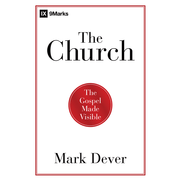By Mark Dever /
B&H Academic

What are Christians supposed to believe? How should we live out the gospel? Followers often debate these basic questions. What can we make of such differences? In this primer on the sufficiency of Scripture, Dever shows how God's Word guides us in assembling for corporate worship, teaches us about life and doctrine, and more. 224 pages, softcover from B&H.
Many Christians, though they may regularly participate in the ministry of the Church, never really take the time to think through what exactly the Church is or how it should function. In the midst of the cultural assault on both the Bible and the Gospel many believers are happy just to find anyplace where they can go and hear biblical teaching. Denominational distinctives and differences in how various churches handle membership, discipline, and decision making have seemingly begun to fade into the background. Of course, as soon as there is some kind of issue to be resolved all of those various distinctives come into play in a very practical way. In this book Mark Dever calls our attention to the biblical teaching regarding the nature and function of the Church and how it is related to the Gospel itself.
The book is divided into
three parts, each of which has chapters that are focused on a specific element
of the study of the Church (ecclesiology).
Part 1: What Does the Bible Say?
1.
The Nature of
the Church
2.
The Attributes
of the Church, One, Holy, Universal, Apostolic
3.
The Marks of
the Church
4.
The Membership
of the Church
5.
The Polity of
the Church
6.
The Discipline
of the Church
7.
The Purpose of
the Church
8.
The Hope of
the Church
Part 2: What Has the Church Believed?
9.
The History of
the Idea of the Church
10. The History of the Ordinances of the Church
11. The History of the Organization of the Church
Part 3: How Does it All Fit Together?
12. A Protestant
Church
13. A Gathered Church: Putting Together the Membership
of the Church
14. A Congregational Church: Putting Together the
Structure of the Church
15. A Baptist
Church
16. Conclusion: Why Does This Matter?
Dever’s passion for the
topic is apparent as you read this book. It is a serious examination of the
topics involved but Dever writes with a pastor’s heart. He is writing from a
Baptist perspective but his explanations of the differences in church organization and
why they exist is handled in an effective and fair way. He seeks to honor the
unity of the Church proper while recognizing the importance of denominational
and local churches as individual and distinct gatherings of believers.
The book is well argued
and well documented. Even when I had a slightly different view than what he was arguing for I
found myself compelled by his explanations to think and study the issues more
carefully. I especially appreciated his analysis of the texts used to support
congregationalism and his emphasis on the inseparable relationship between
Christ, the Gospel, and the Church. From a practical perspective the chapter on
why there should be Baptist churches today and why the doctrine of the Church
matters were timely and well done.
Dever’s skillful handling
of the biblical teaching and the historical sources leads to a substantial but
accessible overview of one of the most important yet sadly neglected doctrines
in the Bible. He reminds us that The Church is not just a functional category
but it is an integral part of God’s plan of salvation. The book is well argued and yet is not overly technical. It is a good overview of the biblical teaching on the nature and function of the Church. It may be particularly helpful to those who are curious about the differences between and reasons for the various types of church organization such as episcopal, presbyterian, congregational, etc. I recommend it to anyone with an interest in the doctrine of The Church and to every Christian who has never thought about it before.
No comments:
Post a Comment